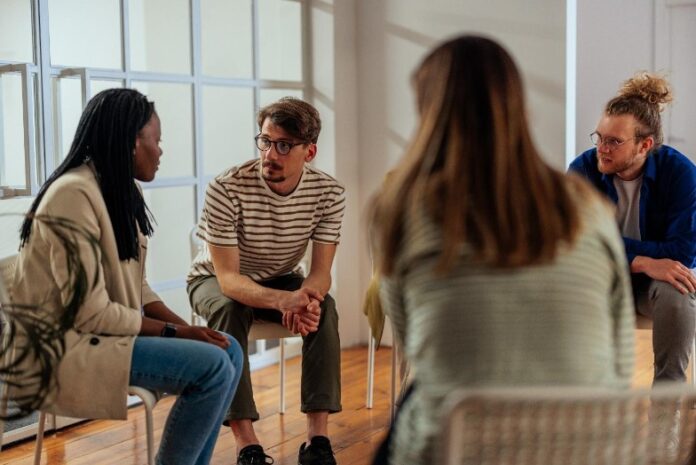Counselors and therapists use various techniques to help clients overcome their mental and emotional health challenges. One therapeutic technique that is gaining popularity is group therapy. Group therapy involves one or more therapists bringing together patients with similar issues or concerns to share their experiences and support each other during treatment.
Table of Contents
What is group therapy?
Group therapy is a unique type of psychotherapy that involves one or more trained counselors leading a group of up to 15 individuals in a therapy session. These sessions focus on particular areas of concern, for example, depression, social anxiety, substance abuse, panic disorder, and so on. Group therapy sessions may be used as part of a mental health treatment plan or as a therapy plan on their own.
The different types of group therapy counselors can adapt in their practice include:
- Cognitive behavioral groups: These groups help patients to alter their learned behaviors. When participants share their experiences in a group, they can change their thought processes, beliefs, and perceptions.
- Skill development groups: These skills focus on enhancing skills that group participants may need to improve their quality of life. Counselors can use group therapy to help their patients learn coping skills, emotional control, and socialization skills.
- Psychoeducational groups: Mental health patients require education on their diagnosis. Psychoeducation groups help patients to avoid destructive behaviors and work towards change in an accommodating environment.
How counselors use group therapy in mental health treatment
Counselors incorporate group therapy in their treatment plans to achieve the following:
-
Provide a safe and supportive environment for recovery
Group therapy provides a safe space where participants feel understood and validated by others with similar challenges. The group can be a source of emotional support for individuals who feel isolated or disconnected from others. Counselors help individuals connect with others facing similar concerns, encouraging them to speak up without shame.
-
Building social skills
Counselors can help their clients to improve their social skills effectively. An individual may learn to speak up more and practice assertiveness in communication. A counselor can initiate role-playing of social situations to encourage participants to learn how to navigate them within the group session. Such group activities are helpful for patients who struggle with social anxiety or have difficulty maintaining healthy relationships.
-
Offering different life perspectives
Counselors may use group therapy sessions to show their patients different life perspectives. In cases where a patient has distorted views of their experiences and emotions, hearing the perspectives of others may help them gain a balanced understanding of their situations. A counselor may encourage participants to challenge their assumptions and see things differently, leading to healing and personal growth.
How counselors develop groups for therapy
Like any other health practice, counselors need to understand group dynamics for their treatment plans to be effective. Counselors need training on the different stages of group development to understand the effectiveness of the group as a treatment plan. The different stages of group development include:
- The forming stage is the beginner stage of group development, where participants tend to be highly dependent on the counselor. A good counselor should use this stage to educate the participant on the importance of group therapy in their treatment plan.
- The storming stage is the second stage, where participants can share their experiences in the group. Counselors are trained to resolve conflicts among the participants and help them develop strong relationships.
- The norming stage: In this stage, the participants can accommodate each other’s presence and opinions and are more active than the counselor in the group.
- Performance stage: The group can function independently from the counselor as participants can navigate each other’s strengths and weaknesses.
- The adjourning stage is when group therapy has been achieved, and the counselor has to end the sessions. Counselors need to know how to navigate this stage to avoid feelings of separation anxiety from group members and facilitate a healthy transition to other treatment plans or life outside the group.
Importance of group therapy training
Mental health education is essential as it helps new and existing practitioners sharpen their skills and become effective. Group therapy training can help mental therapists in the following ways:
- Developing expertise: Group therapy training can help counselors learn how group dynamics work. Counselors can learn different group therapy theories, techniques, best practices, and how to manage their groups effectively.
- Gain better patient outcomes: Counselors who get group therapy training can help their patients offer their patients more effective and efficient treatment. Group therapy training equips counselors with evidence-based strategies and techniques to help patients meet their treatment goals.
- Enhance communication skills: Counselors can learn better communication skills, which is essential in group therapy sessions. Counselors can learn how to encourage communication among group participants and provide feedback in group sessions.
- Learn practical skills: Group therapy training equips counselors with practical skills, like developing and implementing treatment plans, managing group conflicts, and conducting assessments within the group. This training equips therapists with the skills to structure healthy group sessions, establish rules within groups, and manage the group participants.
- Improve self-awareness: Self-awareness is essential for effective group therapy. Counselors learn how their beliefs, emotions, and biases impact group dynamics and how to manage them for the benefit of their patients.
Where to get group therapy training
Mental health counselors must meet a certain number of continuing education and practice hours to gain a practice license, and group therapy training can count towards this requirement.
Many universities and colleges offer courses in counseling, ranging from diploma courses to degree courses. Suppose you are a practicing counselor wishing to advance your skills to include group therapy development skills. In that case, you can sign up for the online doctorate in counseling offered by the American International College. This course contains modern group therapy skill training and practices and is recognized internationally.
Group therapy training can help you make beneficial strides in your counseling practice. With proper training, you can offer relevant group therapy sessions to your clients and stay competitive in your field. Choosing a modern and comprehensive course in counseling will help you deliver positive outcomes in your group therapy sessions.

